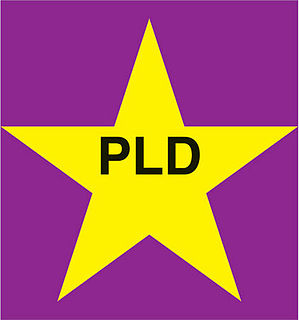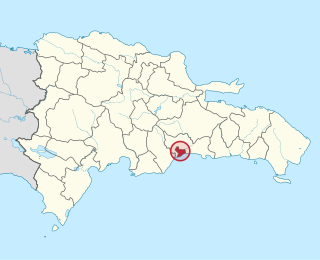
The Dominican Republic is a representative democracy, where the President of the Dominican Republic functions as both the head of the government and head of the multi-party system. Executive power is exercised by the government. Legislative power is vested in the bicameral National Congress. The Judiciary is independent of the executive and the legislature.

The Chamber of Deputies is the lower chamber of the Congress which, along with the Senate, composes the legislature of the Dominican Republic.
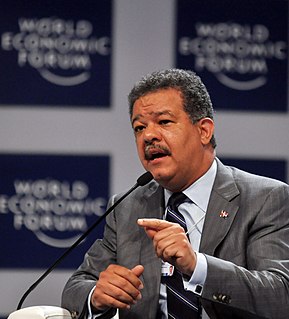
Leonel Antonio Fernández Reyna is a Dominican lawyer, academic, and was President of the Dominican Republic from 1996 to 2000 and from 2004 to 2012. Since January 2016, he is the President of the EU–LAC Foundation.
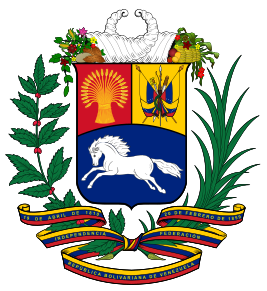
Elections in Venezuela are held at a national level for the President of Venezuela as head of state and head of government, and for a unicameral legislature. The President of Venezuela is elected for a six-year term by direct election plurality voting, and is eligible for re-election. The National Assembly (Asamblea Nacional) has 165 members (diputados), elected for five-year terms using a mixed member majoritarian system. Elections also take place at state level and local level.
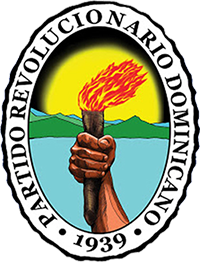
The Dominican Revolutionary Party is one of the main political parties of the Dominican Republic. Traditionally a left of the centre position and social democratic in name, the party has shifted since the 2000s toward the centre-right. The party’s distinctive color is white. Traditionally, the party has two presidents: the "Titular President" and the "Acting President" ; until 2010 the Presidents and the Secretary-General were proscribed to run for any elected office.

The Dominican Republic is a unitary state with elected officials at the national and local levels. On a national level, head of state, the President, is elected directly by the people. All members of a national legislature, The Congress of the Republic divided in two chambers. The Chamber of Deputies and the Senate. There are also elected offices at the local level. It is estimated that across the whole country, over four thousand offices are filled in every electoral cycle.

The National Congress is the legislative branch of the government of Honduras.
The National Progressive Force, is a political party in the Dominican Republic, with a centre-right position, Although the policies he defends place him on the spectrum as a party of far-right. Currently the party is in sixth place of preference of the electorate.

A parliamentary election was held in the Dominican Republic on 16 May 2010 to elect members to the 32 seats in the Senate and 183 seats in the Chamber of Deputies. Polls forecasted a victory for the Dominican Liberation Party (PLD) of President Leonel Fernández. Before the election, 96 of the 178 Chamber of Deputies seats and 22 of the 32 Senate seats were controlled by the PLD.

Presidential elections were held in the Dominican Republic on 20 May 2012. They were the fifth quadrennial elections for the presidency and vice-presidency since 1998, when a change in the electoral law separated the presidential from the congressional and municipal elections.

Miguel Octavio Vargas Maldonado is a civil engineer, businessman, and politician from the Dominican Republic. He is the chairman of the Dominican Revolutionary Party, a minority party allied with the PLD government and current Minister of Foreign Affairs.
Jorge Radhamés Zorrilla Ozuna is a Dominican lawyer, politician, and retired General of the Dominican Army. He is the President and founder of the Civic Renovation Party. He was Chief of Staff of the Dominican Army from 2003 to 2004 and is the current Director of the National Institute of Price Stabilization.

The Civic Renovation Party is an emerging party in Dominican Republic, founded in 2006 as a political movement called Civic Renovation Movement, by Jorge Radhamés Zorrilla Ozuna and a group of Dominican citizens with social democratic orientation. On December 16, 2009 the Civic Renovation Party is recognized by Junta Central Electoral and in 2012 participated in the presidential elections, supporting the candidate of the Dominican Liberation Party, Danilo Medina, through the Purple Alliance.

The Alternative Democratic Movement is a political party in the Dominican Republic.

The Country Alliance is a political party in the Dominican Republic.
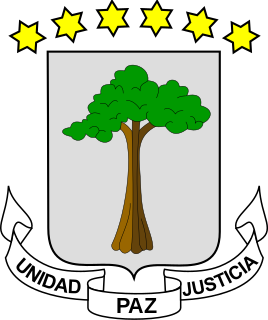
Parliamentary elections were held in Equatorial Guinea on 12 November 2017. The ruling Democratic Party of Equatorial Guinea won all but one of the seats in the Chamber of Deputies, every seat in the Senate and control of every local council.
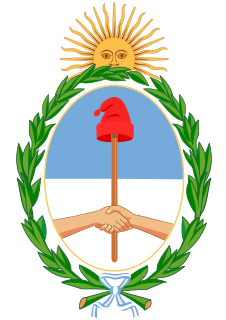
General elections will be held in Argentina on 27 October 2019, to elect the president of Argentina, members of the national congress and the governors of most provinces. Mauricio Macri is the sitting president, and will run for re-election.

General elections will be held in the Dominican Republic on 17 May 2020. The elections will see a new president and vice president, 32 senators and 190 deputies elected. If no presidential candidate wins in the first round of voting, there will be a run-off on 28 June.




